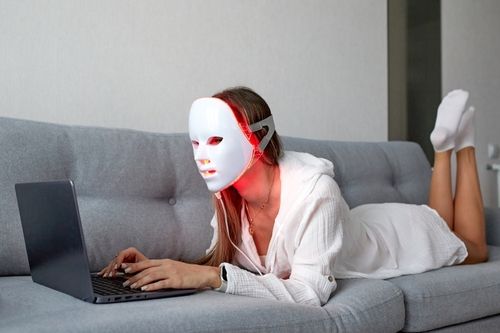
Get Lit or Get Zits: Unmasking the Truth About LED Face Masks
- Jul 31, 2025
Star Wars references and the promise of flawless skin-then enters LED light masks. They offer the astonishing visuals of Stormtrooper headgear along with a clearer complexion. But do these celebrities' favorite beauty devices live up to their hype? Let's delve into some LED enlightenment before you decide to laser your dough on them.
Are they playing it safe, or just playing you? Research points to an "excellent" safety profile for LED masks employing blue, red, and infrared lights. According to Mountain Trooper Sheel Desai Solomon, MD, a dermatologist in Raleigh-Durham, North Carolina: "LED devices aren't the new kid on the block. They've been the go-to for skin gurus to treat post-facial inflammation, curb breakouts, and provide an overall skin perk-up." Today, you can buy these gadgets and glow up at home. But wait, can we trust social media and its starry endorsements of these devices, like January Jones, the ex-Mad Men star, who danced around wearing a red LED mask while sipping on some good old Coors Light?
LED Masks: A Rainbow of Promises LEAD masks use light wavelengths to incite molecular-level changes. And it's a vibrant show! Each color targets a specific skin concern. Want to combat those wrinkles? Red light stimulates collagen and boosts circulation, tackling ageing and sun-damaged skin. Acne-ridden? Blue light zaps bacteria that trigger breakouts-one research review even stamped it as a 'safe and effective treatment. While red and blue lights from LED masks rule the roost, some brands boast different colors, like yellow (to tone down redness) and green (to tame pigmentation).
Say it like it is: Do LED masks get the job done? The science behind LED masks and specific light wavelengths suggests they can be a skincare boon. Evidence from a study featuring 52 females showed that red LED light treatment significantly improved eye-area wrinkles after 12 weeks. The downside? The lack of comprehensive, long-term research that makes it difficult to standardize treatment recommendations.
Blue LED light therapy over six weeks, in a small-scale study, showed a reduction in acne and inflammatory proteins. Home-based devices have received favorable recommendations for treating acne due to their potential bacteria-killing properties-now that's a bright idea.
Word of caution, folks: home devices may not match up to clinical devices in terms of potency. If you’re buying, also ensure your skin-care regimen is solid to support light therapy-use it alongside your topicals or prescribed in-office treatments.
Managing the risks: LED enlightened While LED masks are generally safe, it's smart to do your homework before buying one. Protect your eyes-even popular brands like Neutrogena have had LED masks recalled over potential risks of eye injury. And choose a device explicitly cleared by the U.S. Food & Drug Administration.
The effects of blue light are still under research-existing studies suggest potential skin damage that could lead to aging. But the impact of blue light on human skin needs more evidence. In some cases, it may be smarter to skip these masks, especially if you have specific skin conditions. Reports show these are largely safe for people with conditions like eczema, psoriasis, and rosacea, but there's insufficient long-term safety data.
Bottom line: LED light masks could be a fun addition to your skin therapy, offering potential benefits, such as boosting collagen production and battling acne-causing bacteria. But remember, these are home devices and may not parallel the effects of clinical treatments. Always ensure you're using them safely, wearing eye protection, and duelling acne with your regular skin-care routine intact. LED masks are a step towards radiant skin, not a one-stop solution.
Remember, LED light therapy has been a dermatologist's friend for decades, and at-home masks have gained popularity recently. Their safety profile is generally favourable, but much more research is required to standardize their use and assess their long-term safety. Before you make a light jump to purchase, talk to your skin wizard, er… dermatologist and use proper eye shields tailor-made for these devices.






